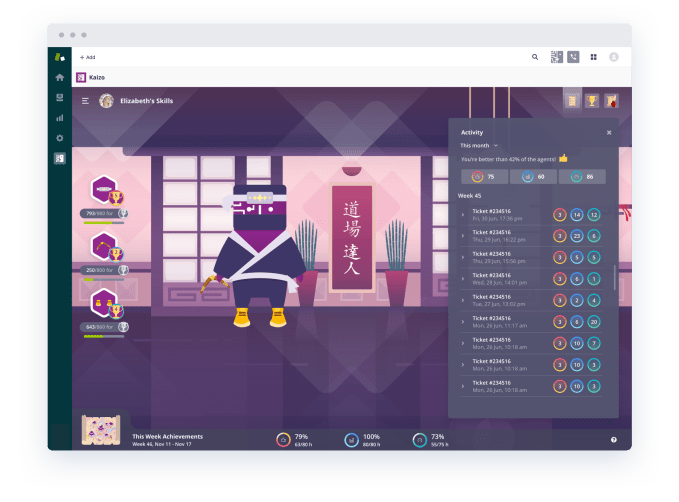CRM has for years been primarily a story of software to manage customer contacts, data to help agents do their jobs, and tools to manage incoming requests and outreach strategies. Now to add to that we’re starting to see a new theme: apps to help agents track how they work and to work better.
Today comes the latest startup in that category, a Dutch company called Kaizo, which uses AI and gamification to provide feedback on agents’ work, tips on what to do differently, and tools to set and work to goals — all of which can be used remotely, in the cloud. Today, it is announcing $3 million in a seed round of funding co-led by Gradient — Google’s AI venture fund — and French VC Partech.
And along with the seed round, Kaizo (which rebranded last week from its former name, Ticketless) is announcing that Christoph Auer-Welsbach, a former partner at IBM Ventures, is joining the company as a co-founder, alongside founder Dominik Blattner.
Although this is just a seed round, it’s coming after a period of strong growth for the company. Kaizo has already 500 companies including Truecaller, SimpleSurance, Miro, CreditRepairCloud, Justpark, Festicket and Nmbrs are using its software, covering “thousands” of customer support agents, which use a mixture of free and paid tools that integrate with established CRM software from the likes of Salesforce, Zendesk and more.

Customer service, and the idea of gamifying it to motivate employees, might feel like the last thing on people’s minds at the moment, but it is actually timely and relevant to our current state in responding to and living with the coronavirus.
People are spending much more time at home, and are turning to the internet and remote services to get what they need, and in many cases are finding that their best-laid plans are now in freefall. Both of these are driving a lot of traffic to sites and primarily customer support centers, which are getting overwhelmed with people reaching out for help.
And that’s before you consider how customer support teams might be impacted by coronavirus and the many mandates we’ve had to stay away from work, and the stresses they may be under.
“In our current social climate, customer support is an integral part of a company’s stability and growth that has embraced remote work to meet the demands of a globalized customer-base,” said Dominik Blattner, founder of Kaizo, in a statement. “With the rise of support teams utilizing a digital workplace, providing standards to measure an agent’s performance has never been more important. KPIs provide these standards, quantifying the success, achievement and contribution of each team member.”
On a more general level, Kaizo is also changing the conversation around how to improve one’s productivity. There has been a larger push for “quantified self” platforms, which has very much played out both in workplaces and in our personal lives, but a lot of services to track performance have focused on both managers and employees leaning in with a lot of input. That means if they don’t set aside the time to do that, the platforms never quite work the way they should.
This is where the AI element of Kaizo plays a key role, by taking on the need to proactively report into a system.
“This is how we’re distinct,” Auer-Welsbach said in an interview. “Normally KPIs are top-down. They are about people setting goals and then reporting they’ve done something. This is a bottom-up approach. We’re not trying to change employees’ behaviour. We plug into whatever environment they are using, and then our tool monitors. The employee doesn’t have to report or measure anything. We track clicks on the CRM, ticketing, and more, and we analyse all that.” He notes that Kaizo is looking at up to 50 datapoints in its analysis.
“We’re excited about Kaizo’s novel approach to applying AI to existing ticket data from platforms like Zendesk and Salesforce to optimize the customer support workflow,” said Darian Shirazi, General Partner at Gradient Ventures, in a statement. “Using machine learning, Kaizo understands which behaviors in customer service tickets lead to better outcomes for customers and then guides agents to replicate that using ongoing game mechanics. Customer support and service platforms today are failing to leverage data in the right way to make the life of agents easier and more effective. The demand Kaizo has seen since they launched on the Zendesk Marketplace shows agents have been waiting for such a solution for some time.”
Kaizo is not the only startup to have identified the area of building new services to improve the performance of customer support teams. Assembled earlier this month also raised $3.1 million led by Stripe for what it describes as the “operating system” for customer support.
Comments
Post a Comment